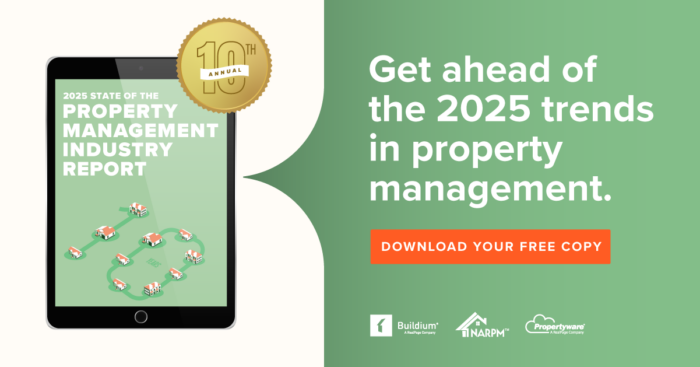Heading into 2025, property management companies face a number of obstacles: They’re challenged to expand their portfolios without compromising the quality of service they deliver to their customers.
They’re challenged to grow their revenue in spite of increased costs and flat rent growth in many areas of the U.S.
They’re challenged to prove the value of their services to cash-strapped rental owners in a competitive business environment.
And they’re challenged to exceed customers’ expectations by balancing the right technology with a human touch—all while keeping up with evolving market conditions and property management industry trends.
To help property management companies meet the moment, Buildium and Propertyware banded together with the National Association of Residential Property Managers to survey thousands of property management professionals, renters, and rental owners, as we do each year.
We combine insights from our annual survey with market research to help property management companies understand the trends that will impact their success in the year to come.
Which property management trends have we identified for 2025? That’s what we’ll cover in this blog post.
For an even deeper dive into each of the property management industry trends shaping the current business environment, be sure to download your free copy of our 10th annual State of the Property Management Industry Report.
Property Management Trend #1: Most Companies Still Plan to Grow, But at a Slower Pace
Portfolio growth remains the top priority for virtually all property management companies in the coming year—but their pace of growth is moderating from the breakneck speed of the last few years.
Looking ahead to 2025 and 2026, 91% of third-party property management companies told us they plan to expand their portfolios, according to our most recent Property Management Industry Survey.
However, when we asked how much growth they have planned, in comparison with past years, a larger segment of companies told us they plan to grow by 25% or less.
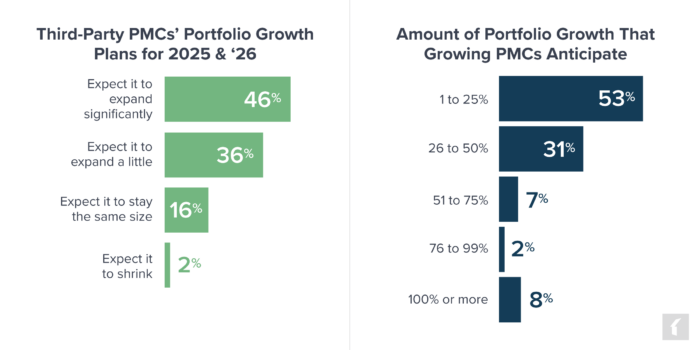
How do they plan to accomplish this growth? More than 3 in 4 third-party property management companies will be actively recruiting new clients in the next two years, making this their #1 portfolio growth strategy.
But as we’ve seen in recent years, a significant minority of companies are investigating inorganic growth methods, such as acquiring other property management businesses, or purchasing or building new properties of their own.
Property Management Trend #2: Companies Are Branching Out to Bring in New Business
One of the most significant property management trends for 2025 is portfolio diversification. As virtually all property management companies seek to grow, many are exploring new property types and markets.
Our most recent Property Management Industry Survey found that 31% of third-party property management businesses plan to expand the types of properties they manage in the next two years, such as expanding from single-family rentals into multifamily, or from residential rentals into community associations or commercial properties.
In addition, 23% of third-party property management companies plan to expand to a new geographic area in the next two years.
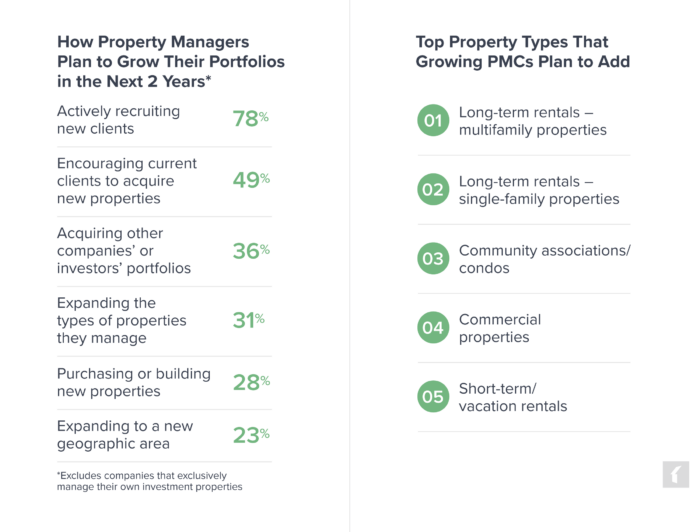
The results of companies’ efforts to grow are already evident: Comparing this year’s survey responses to last year’s, we saw a 5-percentage-point decrease in the number of companies with less than 100 units under management.
Property Management Trend #3: Outpacing Rising Costs Remains a Primary Challenge
The latest property management trends show a complex relationship between growth and cost. While portfolio expansion remains a priority across the industry, property management companies face increasing pressure on their bottom line. Though a majority of businesses expect their revenue to increase, they’re anticipating slightly less revenue growth than they did in 2022 and ‘23.
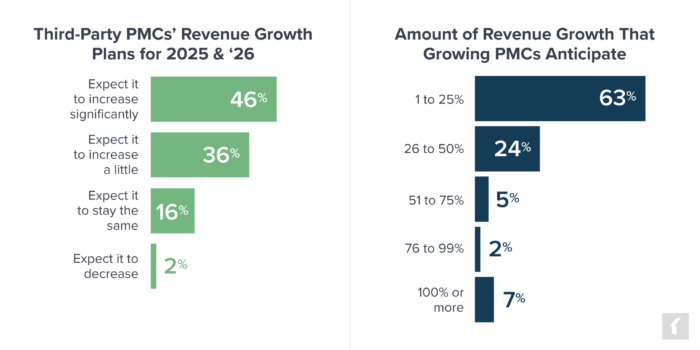
What’s causing businesses’ revenue growth expectations to moderate? Costs have continued to increase across the board, with three-quarters of companies reporting that labor costs, property insurance, property taxes, and materials/supply costs have risen over the past year.
To cover increased costs in 2025, 63% of third-party property management companies plan to raise rents or resident-paid fees, according to our most recent Property Management Industry Survey. However, rents can only be raised so high when the supply of rental housing is increasing relative to demand, and renters’ wage growth isn’t keeping up.
In addition, two services that once reliably generated revenue (leasing/marketing vacancies and purchasing/selling/brokering property sales) have become far less profitable for property management companies as the market has evolved, with renters moving less often and investors buying fewer properties.
Property Management Trend #4: Tenant Quality Concerns Necessitate Consistent Screening
When we asked property management professionals what they expect their companies’ foremost challenge to be heading into 2025, the most popular response was tenant quality.
After focusing their efforts on resident retention over the past year—efforts that have largely proven successful—finding residents who can stay put in their properties for the long term has become a clear area of focus.
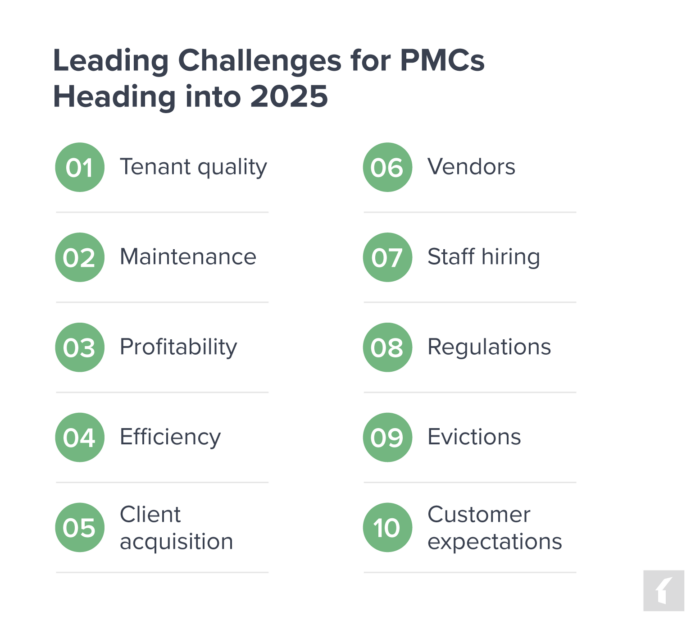
As we mentioned in the previous trend, when setting rent prices, property management companies are challenged to balance the need to cover rising costs with the need to attract and retain great residents.
Current property management industry trends emphasize the importance of robust tenant screening. Finding the right residents for each property requires sophisticated screening procedures to avert fraud and avoid evictions down the line.
One respondent described how they’re focused on “finding the best renter possible by being extra diligent and discerning (staying within legal mandates, of course) to ensure we secure conscientious, responsible applicants. We are striving for zero vacancies and fast turnovers.”
Property Management Trend #5: Technology is Key to Good Service—But So is a Human Touch
Technology adoption stands out among the defining property management trends of 2025, with efficiency ranking as property management companies’ second-highest priority for 2025.
Having the right processes and systems in place is particularly important as companies focus on expanding their portfolios, keeping costs down, and improving the customer experience. This reflects a broader trend of leveraging technology to enhance rather than replace human interaction.
As one respondent to our Property Management Industry Survey put it: “With the push in prop tech, we have ways to make processes more efficient and automated, meaning our manpower can focus on customer service and identifying areas to increase profit per door.”
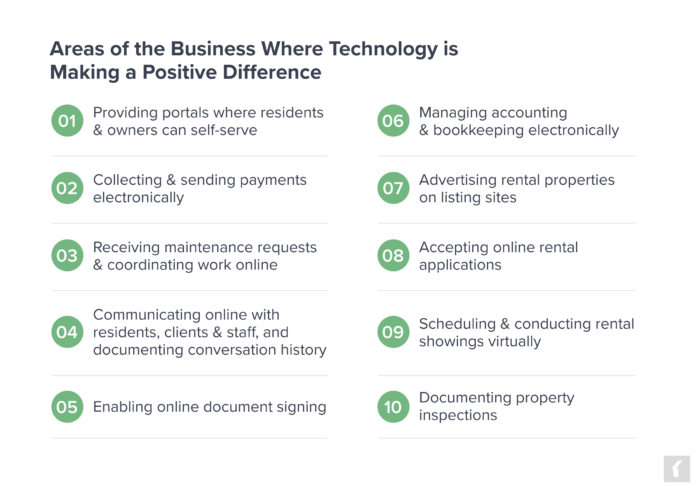
But having the right tools is only half the battle. Companies have to strike a balance between technology and the human touch to differentiate them from their competitors, build enduring relationships between customers and team members, and reach their growth goals.
Key Action Steps to Address Property Management Industry Trends in 2025
As the property management industry continues to evolve, success depends on taking decisive action informed by current market insights. To help your company thrive amid these changing dynamics, here are actionable strategies to address the property management trends we’ve discussed:
- Drive portfolio growth strategically: Balance expansion goals with service quality by carefully evaluating new markets and property types. Consider both organic growth through client recruitment and potential acquisitions.
- Optimize revenue despite cost pressures: Combat rising operational costs by streamlining processes, negotiating vendor partnerships, and identifying new revenue streams beyond traditional leasing and brokerage services.
- Enhance tenant screening and retention: Implement robust screening procedures while maintaining competitive rent levels. Focus on finding quality, long-term residents to reduce turnover costs and maintain steady cash flow.
- Modernize your technology stack: Invest in comprehensive property management platforms that combine automation capabilities with robust security features to improve efficiency without sacrificing personal service.
- Strengthen your team’s capabilities: Create an environment that attracts and retains top talent through competitive compensation, professional development opportunities, and efficient workflows that maximize productivity.
The 2025 State of the Property Management Industry Report
There’s so much more research packed into our 2025 Property Management Industry Report, including deeper insights into the property management trends that will impact your company’s success in the year to come, as well as the technologies that will extend your team’s ability to deliver customer service that differentiates you from the competition. Download your free copy now.
Read more on Industry Research

